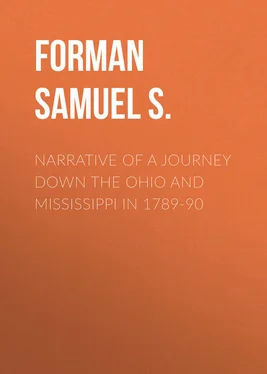Samuel Forman - Narrative of a Journey Down the Ohio and Mississippi in 1789-90
Здесь есть возможность читать онлайн «Samuel Forman - Narrative of a Journey Down the Ohio and Mississippi in 1789-90» — ознакомительный отрывок электронной книги совершенно бесплатно, а после прочтения отрывка купить полную версию. В некоторых случаях можно слушать аудио, скачать через торрент в формате fb2 и присутствует краткое содержание. Жанр: foreign_antique, foreign_prose, на английском языке. Описание произведения, (предисловие) а так же отзывы посетителей доступны на портале библиотеки ЛибКат.
- Название:Narrative of a Journey Down the Ohio and Mississippi in 1789-90
- Автор:
- Жанр:
- Год:неизвестен
- ISBN:нет данных
- Рейтинг книги:5 / 5. Голосов: 1
-
Избранное:Добавить в избранное
- Отзывы:
-
Ваша оценка:
- 100
- 1
- 2
- 3
- 4
- 5
Narrative of a Journey Down the Ohio and Mississippi in 1789-90: краткое содержание, описание и аннотация
Предлагаем к чтению аннотацию, описание, краткое содержание или предисловие (зависит от того, что написал сам автор книги «Narrative of a Journey Down the Ohio and Mississippi in 1789-90»). Если вы не нашли необходимую информацию о книге — напишите в комментариях, мы постараемся отыскать её.
Narrative of a Journey Down the Ohio and Mississippi in 1789-90 — читать онлайн ознакомительный отрывок
Ниже представлен текст книги, разбитый по страницам. Система сохранения места последней прочитанной страницы, позволяет с удобством читать онлайн бесплатно книгу «Narrative of a Journey Down the Ohio and Mississippi in 1789-90», без необходимости каждый раз заново искать на чём Вы остановились. Поставьте закладку, и сможете в любой момент перейти на страницу, на которой закончили чтение.
Интервал:
Закладка:
After the evacuation, Mr. Forman witnessed the affectionate and affecting parting of Washington and his officers, when he entered a barge at Whitehall wharf, manned by sea captains in white frocks, who rowed him to the Jersey shore, to take the stage for Philadelphia, on his way to Congress. Mr. Forman also saw General Washington while presiding over the convention of 1787, to form a Constitution for the new Republic. The general was attired in citizen’s dress – blue coat, cocked hat, hair in queue, crossed and powdered. He walked alone to the State House, the place of meeting, and seemed pressed down in thought. A few moments before General Washington took his seat on the rostrum, the venerable Dr. Franklin, one of the Pennsylvania delegates, was brought in by a posse of men in his sedan, and helped into the hall, he being severely afflicted with palsy or paralysis at the time. On the adoption of the Constitution, a great celebration was held in New York to commemorate the event, which Mr. Forman also witnessed. A large procession was formed, composed of men of all avocations in life, and each represented by some insignia of his own trade or profession, marching through the streets with banners, flags, and stirring music. A full-rigged vessel, called “The Federal Ship Hamilton,” was drawn in the procession, and located in Bowling Green, where it remained until it fell to pieces by age.
After spending some years as a clerk in mercantile establishments in New York City, and once going as supercargo to dispose of a load of flour to Charleston, he engaged in merchandising at Middletown Point, New Jersey. Mr. Forman subsequently made the journey down the Ohio and Mississippi, in 1789-’90, as given in considerable detail in the narrative which follows. While spending the winter of 1792-’93 in Philadelphia, he witnessed the inauguration of Washington as President, at the beginning of his second term of office, and was within six feet of him when he took the oath of office. “I cast my eyes over the vast crowd,” says Major Forman, “and every eye seemed riveted on the great chief. On Washington’s right sat Chief-Justice Cushing, and on his left Senator Langdon, of New Hampshire. After sitting a little while in profound silence, the senator arose, and asked the President if he was ready to take the oath of office. General Washington rose up, having a paper in his left hand, when he made a very short address. Then Judge Cushing stood up, with a large open Bible before him, facing the President, who laid his hand upon the sacred volume, and very deliberately and distinctly repeated the oath of office as pronounced by the chief-justice. When Washington repeated his own name, as he did at the conclusion of the ceremony, it made my blood run cold. The whole proceedings were performed with great solemnity. General Washington was dressed in deep mourning, for, it was said, a favorite nephew who had lived at Mount Vernon during the Revolutionary war. He wore his mourning sword. Mrs. Washington was about the middling stature, and pretty fleshy.”
Mr. Forman now entered into the employ of the Holland Land Company, through their agents, Theophilus Cazenove and John Lincklaen, to found a settlement in the back part of the State of New York, where that company had purchased a large body of land. He accordingly headed a party, in conjunction with Mr. Lincklaen, for this purpose, conveying a load of merchandise to the point of operations, passing in batteaus up the Mohawk to old Fort Schuyler, now Utica, beyond which it was necessary to open up a road for the teams and loads of goods; lodging in the woods when necessary, living on raw pork and bread, which was better than the bill of fare at the well-known tavern in that region, kept by John Dennie, the half Indian – “no bread, no meat;” and one of Dennie’s descendants indignantly resented being referred to as an Indian – “Me no Indian; only Frenchman and squaw!” At length, May 8, 1793, the party arrived on the beautiful body of water, since known as Cazenovia Lake, and founded the village of Cazenovia, where Mr. Forman engaged in felling trees, and erecting the necessary houses in which to live and do business, and in this rising settlement he engaged in merchandising for several years. He held many public positions of honor and trust; was county clerk, secretary for over thirty years of a turnpike company; served as major in a regiment of militia early organized at Cazenovia.
The latter years of his life he spent in Syracuse, where he was greatly respected for his worth, his fine conversational powers, his social and generous feelings. He lived to the great age of over ninety-seven years, dying August 16, 1862. His closing years were embittered over the distracted condition of his country, embroiled in fratricidal war, and his prayer was that the proud flag which he witnessed when it was placed over the ramparts of Fort George, November 25, 1783, might again wave its ample folds over a firmly united American Confederacy. His patriotic prayer was answered, though he did not himself live to witness it.
NARRATIVE OF A JOURNEY DOWN THE OHIO AND MISSISSIPPI, 1789-’90
GENERAL DAVID FORMAN, 6 6 General Forman was born near Englishtown, Monmouth Co., New Jersey. He was, during the Revolutionary war, a terror to the tories of his region, and as brigadier-general commanded the Jersey troops at the battle of Germantown. No less than eighteen of the Forman connection were in his brigade in this engagement. He was subsequently a county judge, and member of the council of state. He died about 1812.
of New Jersey, entered into a negotiation with the Spanish minister, Don Diego de Gardoque, for his brother, Ezekiel Forman, of Philadelphia, to emigrate with his family and sixty odd colored people, and settle in the Natchez country, then under Spanish authority.
I agreed with General Forman to accompany the emigrating party; and, about the last of November, 1789, having closed up my little business at Middletown Point, New Jersey, I set out from the general’s residence, in Freehold, with Captain Benajah Osmun, an old continental captain, who was at that time the faithful overseer of the general’s blacks. There were sixty men, women, and children, and they were the best set of blacks I ever saw together. I knew the most of them, and all were well-behaved, except two rather ill-tempered fellows. General Forman purchased some more, who had intermarried with his own, so as not to separate families. They were all well fed and well clothed.
We had, I believe, four teams of four horses each, and one two-horse wagon, all covered with tow-cloth, while Captain Osmun and I rode on horseback. After the distressing scene of taking leave – for the general’s family and blacks were almost all in tears – we sat out upon our long journey. The first night we camped on the plains near Cranberry, having accomplished only about twelve or fifteen miles. The captain and I had a bed put under one of the wagons; the sides of the wagon had tenter-hooks, and curtains made to hook up to them, with loops to peg the bottom to the ground. The colored people mostly slept in their wagons. In the night a heavy rain fell, when the captain and I fared badly. The ground was level, and the water, unable to run off, gave us a good soaking. I had on a new pair of handsome buckskin small clothes; the rain spoiled their beauty, and the wetting and subsequent shrinkage rendered them very uncomfortable to wear.
The next morning we commenced our journey as early as possible. We drove to Princeton, where we tarried awhile, and all were made comfortable. We crossed the Delaware five miles above Trenton. On arriving at Lancaster, in Pennsylvania, the authorities stopped us, as we somewhat expected they would do. General Forman had furnished me with all the necessary papers relating to the transportation of slaves through New Jersey and Pennsylvania. While Judge Hubley was examining the papers, the servant women informed me that the females of the city came out of their houses and inquired of them whether they could spin, knit, sew, and do housework, and whether they were willing to go to the South; so, if the authorities stopped us, they could all soon have new homes. But our colored women laughed at the Lancaster ladies, who seemed mortified when they learned that we could not be detained.
Читать дальшеИнтервал:
Закладка:
Похожие книги на «Narrative of a Journey Down the Ohio and Mississippi in 1789-90»
Представляем Вашему вниманию похожие книги на «Narrative of a Journey Down the Ohio and Mississippi in 1789-90» списком для выбора. Мы отобрали схожую по названию и смыслу литературу в надежде предоставить читателям больше вариантов отыскать новые, интересные, ещё непрочитанные произведения.
Обсуждение, отзывы о книге «Narrative of a Journey Down the Ohio and Mississippi in 1789-90» и просто собственные мнения читателей. Оставьте ваши комментарии, напишите, что Вы думаете о произведении, его смысле или главных героях. Укажите что конкретно понравилось, а что нет, и почему Вы так считаете.












